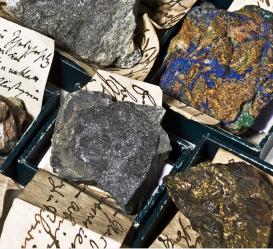Today’s news is full of reports about what economists call a “resource crisis.” Pandemic interruptions in semiconductor and microchip supply chains are affecting every industry. Wood shortages are notably paralyzing paper production. Rising oil and gas prices are endangering the energy sector and widening the poverty gap worldwide. More than ever, this crisis is heightening awareness of the global exploitation, waste, and unequal distribution of natural resources. It is reinforcing ethical concerns about working conditions along transnational supply chains. And it is giving new urgency to questions of how the consumption of natural resources can be sustainably reduced in the technology sector, and thus also in science.
The development of new, fair scientific technologies is the order of the day. However, the current crisis also points to deeper frictions with and around materiality in our culture. The handling of natural resources has grown historically and has been influenced by diverse epistemic, economic, political, and geophysical conditions. Historians of science thus have much to contribute to current debates by unlocking this complex and long history. This working group is intended to provide impetus for such an analysis. We focus on key materials used in a wide range of epistemic technologies, from scientific instruments to humanistic media and everyday objects, all of which made early modern and modern knowledge possible. Our guiding hypothesis is that the knowledge cultures in focus depended essentially on the steady supply of large amounts of natural resources from around the globe; and that the corresponding practices necessary to exploit, process, and provide these resources in the quality and quantity required were closely interlinked with the scientific and humanistic agendas of their time. Accordingly, we apply different scales to reveal the local and global values, epistemic concepts, aesthetic ideals, social systems, (geo)political constellations, and economic frameworks that have co-constituted the making of scientific instruments, artefacts, and knowledge in and beyond the Western world.
Each of the group’s members addresses a specific technological artifact. In so doing, we carve out what kinds of materials were needed and why, and how local means and knowledge practices intersected with global infrastructures to satisfy these demands. Following the material supply chains across regions, oceans, and continents, we reveal contingencies and nodes of uncertainty that were not at all linear but in fact connected to various sorts of unexpected activities. The resources examined include high-end stainless steel needed for precision tuning (Gribenski and Pantalony), wax-based technologies applied in experimental settings (Tkaczyk), paper forms for data processing (von Oertzen), silver money as a medium of knowledge and governance (Felten), glass employed in processes of scientific modeling (Dupré), and porcelain as a key product for both scientific instrument-making and the training of European taste (Marchand). Finally, the project will discuss questions beyond supply and procurement and reflect on issues of maintenance, repair, reuse, and waste in early modern and modern times (Werrett). Taken together, our case studies map a wide range of materials and their uses in the production of knowledge and trace longue-durée changes in the exploitation, processing, and maintenance of such resources.
This working group grew out of a virtual lecture series that we co-organized in the summer term of 2021 at Humboldt University in Berlin. As a follow-up, we hosted a virtual round table at the HSS/SHOT Annual Meeting 2021 in New Orleans and continued our inspiring discussion in several Zoom meetings. An in-person authors’ workshop took place in July 2022 to prepare a collective publication, forthcoming as a Focus Section of the journal Isis in 2023.

